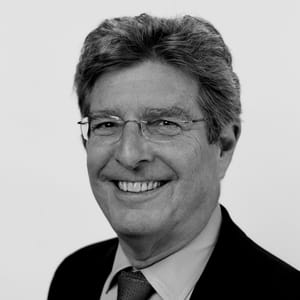
Ellis Rubinstein
President Emeritus
The New York Academy of Sciences
Ellis Rubinstein is an innovator and change agent. During his 18 years leading the 200-year-old New York Academy of Sciences, he created a series of unprecedented initiatives to address many of the planet’s greatest challenges, powered by an extraordinary network of leading experts that includes scores of Nobel Laureates and over 1,000 academic and industry institutional partnerships.
Under Rubinstein’s leadership, the Academy partnered with the United Nations Secretary General and UN agency heads on sustainability, advised heads of state, ministers and mayors on science, technology and innovation policy, and established public/private partnerships to address issues ranging from Alzheimer’s Disease, malnutrition, sustainable “smart cities,” early childhood development, and science, technology, engineering and math (STEM) education.
Rubinstein also developed an unmatched network of the world’s most promising young scientists and engineers thanks to a partnership he forged with the Blavatnik Family Foundation to create a Nobel-like prize for young scientists and engineers. In addition, Rubinstein oversaw the creation of an unprecedented Internet-based initiative—the Global STEM Alliance—designed to identify, inspire and empower a million or more high school students in STEM-based careers.
Before joining the Academy, Rubinstein was a long-time science journalist, where his work earned three National Magazine Awards, the Pulitzer Prize of the American periodicals industry. As an editor at IEEE Spectrum, Science 86, and Newsweek—and as Editor of the renowned journal Science—Rubinstein increased impact and circulation through landmark articles and special issues, redesigns, internationalization in coverage and circulation, and innovations in Web publishing. He earned National Magazine Awards for a four-part series, “Technology for Peace,” developed for Science 85, and two for special issues developed for IEEE Spectrum.Rubinstein received extraordinary national attention for the first of these: the most complete and authoritative account of the nuclear power accident at Three Mile Island and of the vulnerabilities of the entire nuclear power industry. Three other special issues he developed and edited were named National Magazine Award finalists.
While at Science he globalized what was initially an American publication by developing the world’s largest international science news network and establishing its first manuscript-editing hub outside the United States. Rubinstein also negotiated a landmark national license with the leadership of China that enabled millions of Chinese scientists to legally access Science through the internet. In addition he pioneered an internet-based daily news service, “ScienceNow”, a global website for graduate students and post-docs called “Science‘s Next Wave”, and an unprecedented science-based social network called “SAGE KE” or the Science of Aging Knowledge Environment.
Rubinstein conducted the first one-on-one interview with Chinese President Jiang Zemin granted to a western magazine editor, as well as President Bill Clinton’s first interview with a science magazine. He authored a nationally cited investigative report on the controversial derivation of the cell line in which the AIDS virus was grown in the U.S.
At Newsweek, Rubinstein oversaw news coverage during one of the most intense periods in recent U.S. history—the Iran-Contra period—as well as specialty features in science, medicine, religion, and education. He produced a cover package entitled “The Search for Adam and Eve” that was the first description for the general public of the DNA-tracing of the origins of modern humans in Africa. Excluding cover stories on the Iran Contra affair, it became the best-selling edition of Newsweek over a two-year period.
A 1967 magna cum laude graduate in English literature of the University of California, Berkeley, where he also attended graduate school, Rubinstein taught high school English before becoming a journalist. He is a Fellow of the AAAS, a lifetime member of the IEEE and a Foreign Member of Sweden’s Royal Academy of Engineering Sciences. He has been a member of the National Association of Science Writers since 1989. Rubinstein was a member of the World Economic Forum, moderating panels in Davos, Switzerland, and participates on the Council of Japan’s prestigious Science & Technology in Society (STS) Forum, among other external activities. He has honorary degrees in communications from Hallym University in South Korea and in science from the University of Medicine and Dentistry of New Jersey.